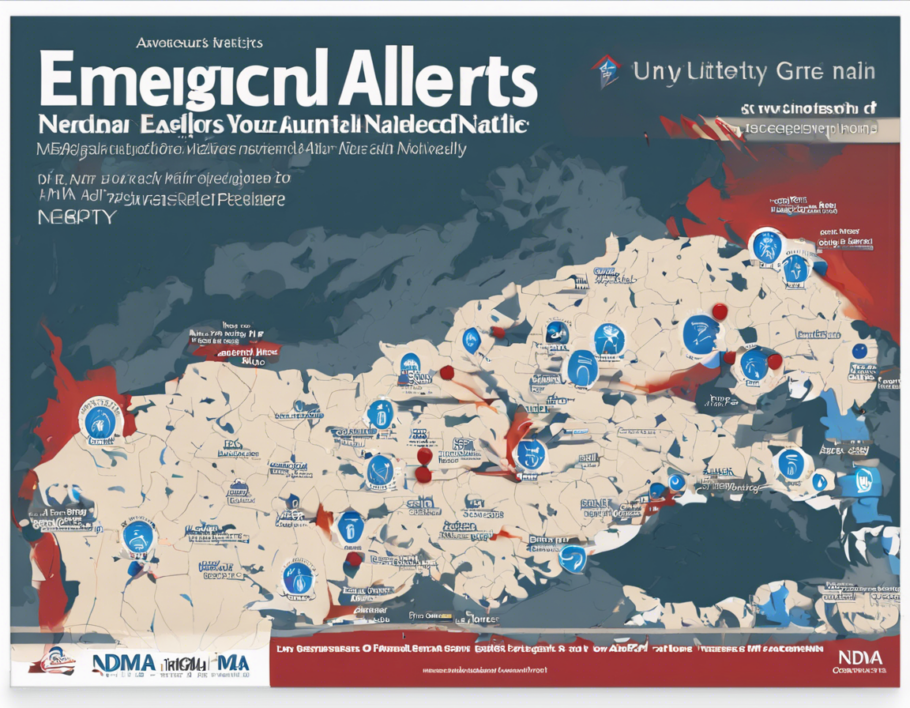Natural disasters can strike at any time, with little to no warning, making it crucial for individuals to stay informed and prepared. The National Disaster Management Authority (NDMA) plays a vital role in providing timely alerts and guidance during emergencies, helping to ensure the safety and well-being of the public. In this article, we will explore the importance of NDMA emergency alerts and how individuals can stay informed and safe during times of crisis.
Understanding NDMA Emergency Alerts
The NDMA is responsible for coordinating disaster management efforts at the national level in order to mitigate the impact of disasters and facilitate a prompt and effective response. One of the key functions of the NDMA is to issue emergency alerts to warn the public about imminent or ongoing disasters such as earthquakes, floods, cyclones, tsunamis, and other natural calamities.
Types of NDMA Alerts
NDMA emergency alerts can be issued in various forms to reach a wide audience and ensure maximum dissemination of information. Some common types of alerts include:
- SMS Alerts: Text messages sent to mobile phones to notify individuals about impending disasters and provide safety instructions.
- Broadcast Alerts: Emergency messages broadcasted on radio and television channels to reach a larger audience.
- Social Media Alerts: Posts on social media platforms informing the public about the latest developments and safety measures.
Importance of NDMA Alerts
Timely and accurate emergency alerts play a crucial role in ensuring the safety and well-being of individuals during disasters. Some key reasons why NDMA alerts are important include:
- Early Warning: Alerts provide early warning about potential disasters, giving individuals valuable time to prepare and take necessary precautions.
- Risk Communication: Alerts help to communicate the risks associated with disasters and educate the public on how to respond appropriately.
- Evacuation Planning: Alerts assist in evacuation planning by guiding people on safe routes and shelter locations.
- Coordination: Alerts help to coordinate response efforts among various agencies and authorities, ensuring a unified and effective response to emergencies.
How to Stay Informed and Safe
In order to benefit from NDMA emergency alerts and stay safe during disasters, individuals can take proactive steps to stay informed and prepared:
Register for Alerts
- Mobile Alerts: Register your mobile number with the NDMA or local authorities to receive SMS alerts directly on your phone.
- Apps: Download emergency alert apps that provide real-time information and updates on disasters in your area.
Stay Updated
- Media: Keep a close eye on news reports and updates from official sources to stay informed about evolving situations.
- Social Media: Follow NDMA and relevant government agencies on social media for instant alerts and guidance.
Prepare an Emergency Kit
- Essentials: Pack a survival kit with essentials such as food, water, medications, first aid supplies, and important documents.
- Communication: Include a battery-powered radio or charger to stay connected and receive updates during power outages.
Have a Plan
- Family Plan: Develop a family emergency plan outlining communication strategies, evacuation routes, and meeting points.
- Practice Drills: Conduct regular emergency drills to ensure everyone in the family knows what to do in case of a disaster.
Community Engagement
- Neighborhood Watch: Stay connected with neighbors and local community groups to share information and support each other during emergencies.
- Volunteer: Consider volunteering with local disaster response teams to assist in relief efforts and community resilience.
FAQs: Frequently Asked Questions
1. How can I sign up for NDMA emergency alerts?
You can register for NDMA emergency alerts by visiting their official website or contacting your local disaster management authority for more information.
2. What should I do if I receive an NDMA alert?
Follow the instructions provided in the alert promptly, which may include evacuation procedures, shelter locations, and safety precautions.
3. Can I opt out of receiving NDMA alerts?
While it is essential to receive emergency alerts, you can usually opt out of non-emergency notifications or choose the types of alerts you wish to receive.
4. Are NDMA alerts always accurate?
NDMA alerts are based on the best available information at the time of issuance; however, it is important to stay updated through multiple sources to ensure accuracy.
5. How often does NDMA issue alerts?
The frequency of NDMA alerts depends on the level of risk and ongoing developments during a disaster. Alerts may be issued as frequently as needed to keep the public informed.
In conclusion, staying informed and prepared during emergencies is crucial for safeguarding lives and minimizing the impact of disasters. By being proactive, registering for NDMA alerts, and following safety guidelines, individuals can take the necessary steps to protect themselves and their loved ones during times of crisis. It is essential to remain vigilant, stay connected with official sources, and actively participate in community resilience efforts to build a safer and more resilient society.

